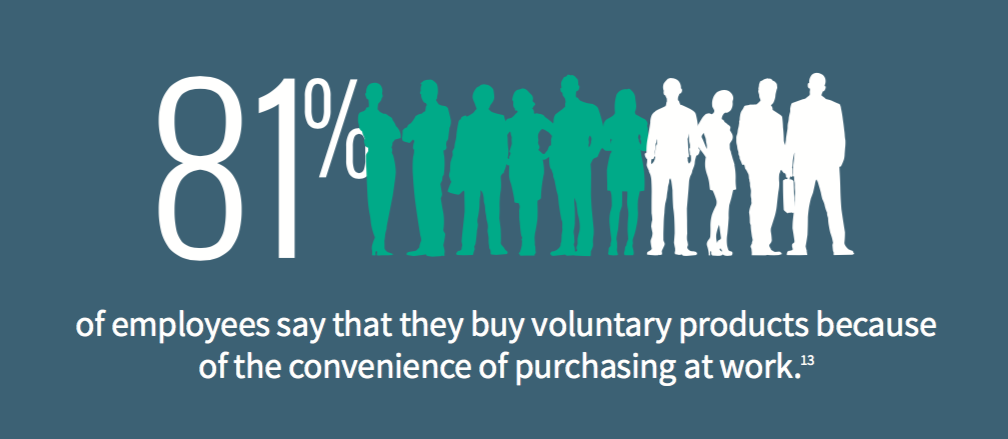When it comes to coverage it is often said that it’s better to be safe than sorry, especially when it comes to insurance benefits.
Voluntary benefits are benefits that your employees are solely responsible for paying for.

You may be thinking that paying extra money to enhance benefits they are already being offered is not the best strategy; but in all reality it is quite opposite. In fact, 81% percent of employees say they will buy voluntary benefits because of the convenience of purchasing through the work place.
Voluntary benefits benefits make a lot of sense for various reasons including; they help fill the gaps in medical coverage for high co-pays and deductibles, they fit the diversity of your workplace by letting employees choose the areas they need more coverage to suit their lifestyle and needs, and you’re allowed to offer more benefits at little to no cost to your company!
These extra benefits fall into 3 categories with subcategories.
The main categories are health, wealth/lifestyle, and security.
Health has 4 subcategories.
- Vision, which includes regular eye exams to help maintain healthy vision and are the first line of defense in detecting more serious eye conditions, such as glaucoma, high blood pressure and diabetes. This type of benefit typically helps pay for eye exams, glasses and contact lenses. They may also offer discounts on treatments such as laser eye surgery or eyecare accessories.
- Dental, which can provide benefits for both routine and more expensive dental procedures that are not covered by most health insurance plans. They typically include cleaning, fillings, sealants, tooth removal, crowns and dentures, and may also provide benefits for regular dental appointments.
- Accidental, these include the unexpected happenstances of everyday life. Typically, they help cover some of the expenses for initial care, surgery, transportation and lodging, and follow-up care.
- Hospital confinement indemnity insurance provides a lump-sum benefit to help with out-of-pocket costs related to a hospital stay. This may include outpatient surgery, diagnostic tests, doctor’s appointments and emergency room trips.
Wealth/Lifestyle has 3 subcategories.
- Disability insurance replaces a percentage of an employee’s income if they become disabled as a result of a covered accident or sickness, to help them continue to make ends meet while they’re out of work.
- Legal typically gives employees access to qualified attorneys at a reduced cost. Coverage usually applies to the most common personal legal matters including family, vehicle, real estate, civil lawsuits and wills.
- Financial counseling helps employees manage their finances. Traditionally, this has mainly focused on retirement plans, but as baby boomers approach the end of their working careers, financial counseling now also includes a range of topics such as credit card debt, investment advice, tax advice, saving and budgeting.
Security with 3 subcategories.
- Life insurance pays out a lump sum to help provide financial protection for an employee’s family members in the event of the employee’s death. Coverage can be updated to reflect changes in life such as getting married, buying a home or having a child. Most plans offer spouse and child coverage.
- Travel accident insurance is designed to provide extra protection while travelling internationally, supplementing coverage typically provided by an accidental death or dismemberment policy. It typically covers emergency medical and legal fees.
- Identity theft protection does not cover any financial loss as the result of identity theft. Instead, it may include monitoring public records and alerting the employee of any fraudulent use of their personal details, including attempted loans and credit applications. It also covers the cost of repairing the person’s credit history.
When it comes to keeping your employees and their families protected, there is nothing wrong with a little extra.
Warmest regards,
Stacia
